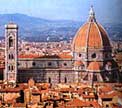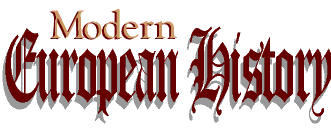
|


|
|
|
Mr. Sedivy's
More Features:
|
Highlands Ranch High School - Mr. Sedivy
- Modern European History
- Habsburgs and French
Overstretch The Spanish Habsburgs built a dynastic state that encompassed Portugal, part of Italy, the Netherlands, and enormous areas in the New World. Spain had become an intercontinental power. The marriage of Ferdinand and Isabella in 1469, united Spain as a political entity. In 1492, the Muslims had been expelled from Granada. Through a series of marriage agreements for their children, Ferdinand and Isabella strengthened their alliances. As a result, their grandson Charles V inherited Spain, the Netherlands, Austria, Sardinia, Sicily, the kingdom of Naples, and Franche Comte. Charles had control of the two richest trading areas in Europe- the Italian states and the Low Countries. Charles saw the conquest of Mexico and was elected Holy Roman emperor. During his reign, he saw problems emerge that would lead to Spain's decline and would weaken the Habsburg dynasty. Charles inheritance was simply too large and spread out to be governed effectively. The "Empire" was challenged on every flank. The Lutheran Reformation was the first successful challenge to Habsburg power. The struggle between Catholic Spain and Protestant Europe would dominate the last half of the 16th century. The Habsburg "Empire" in the New World was vast and with its conquests, gold and silver poured into Spain. But the Habsburgs constant warfare in Europe ate up their capital. This easy access to silver seems to have been detrimental in the long run to the Spanish economy. There was no incentive for the development of domestic industry, entrepreneurship, or international commerce. Constant war hurt the Spanish social class system because it made a military class rather than developing a commercial class. Following the abdication of Charles, his son Philip II inherited the throne. In the 1560's Philip unsuccessfully sent the largest land army ever assembled into the Netherlands to crush the Protestant revolt but Spain lost it's industrial heartland. By the 1580's Philip was over extended in every direction. Spain entered the French religious wars on the side of the Catholics, although this gave them little in regard to power or influence. Philip regarded England as the main Protestant threat, so he sent a Spanish fleet to the island country and suffered a humiliating defeat at the hands of the British and Dutch navies. During the Thirty Years War the Austrian and Spanish Habsburgs joined forces against the Swedes, Germans, Dutch and French. Habsburg aggressions brought no victories. The age of the Habsburg "Empire" was over; the Netherlands and Portugal were independent. The power of Europe had shifted to France. What happened to the Habsburg "Empire"? Strategic overstretch. The Habsburg "Empire" was too spread out with enemies in every direction. Charles V and Philip II let their religious zeal and zest for power over shadow their economic state. The Habsburgs reliance on silver from its colonies and its failure to cultivate industry and to reform their tax system spelled disaster. The Habsburg "Empire" collapsed because the others in Europe opposed it. They tried to build an empire; the others come together and stop it. Frances Louis XIV's system was also fatally flawed. With no effective check on his power and his lust for conquest, there was no limit imposed on the states capacity to wage war which created huge debt. He led a campaign to take the Holy Roman Empire, and tried to bring Spain under control but he underestimated the power of England and the Netherlands in alliance with Austria. The war of Spanish Succession over the long run brought no significant gains. The Seven Years War was without a doubt, an English victory. England took Canada and India; trade comes to an end for France. The result of the wars was that they created a balance of power in Europe, with Britain becoming a major force. Europe had developed a competitive state system- Realpolitik- no friends, no enemies, just interests. The "financial revolution" came into being. Now countries are borrowing money for war. In order to borrow, a state must have a large economic base; agriculture, commerce and manufacturing followed by a banking system. If you don't have public credit; you can't win the wars of this period. Frances involvement in these wars emptied the royal treasury. Direct taxes burdened the poor and were legally evaded by the aristocracy. The pattern of war, excessive taxation of the lower class, and huge debt had damaged French finances. Failure to reform the system led to the French Revolution. Britain was Napoleon's biggest enemy. England would not make peace with any state that sought European hegemony; thus, Napoleon set out to crush them using a new ideology - "total war" which strikes at economic strength. The battle of Trafalgar showed British naval power when Nelson destroyed a combined French and Spanish fleet. Napoleon decided to bring "the nation of shopkeepers" to its knees by damaging the British economy. His plan, called the Continental System was to bar all countries under French control from buying English goods. This caused great economic distress to France; while its ports were closed, industry also slowed or shut down entirely. However, with the increase of trade with the Americas; Britain, while stung, was not paralyzed. Spain had failed to stop Portugal from trading with England; so Napoleon deposed the Spanish ruler and decided to add them to his empire. This will become Napoleon's first step towards overstretch; he simply didn't have the resources to do this. Britain came to the aid of Spain which led to the defeat of France. The "Spanish ulcer" drained Napoleon's treasury, tied down French troops, and gave Britain a foothold on the Continent to invade southern France. Napoleon then set his sites on Russia and his Grand Army was defeated. Most of Europe joined in a final coalition against France. Allied forces from Austria, Russia, Prussia, Sweden, and the Anglo-Spanish captured Paris. Napoleon was forced to abdicate. Napoleon's overstretch gives his greatest enemy a huge victory. Britain is now the number one power. Yes, war is the sport of kings; and the rich ones wins. - Mr. Sedivy's Excellent Information - Sample Research Papers
Information for Students
Research Activity Mr. Sedivy no longer teaches geography, or Modern European History (non AP), but we've decided to leave his web contribution to these classes up anyway. The AP classes cover the same material, but in more detail. Advanced Placement Modern European History
|
Highlands Ranch High School ![]() 9375 South Cresthill Lane
9375 South Cresthill Lane ![]() Highlands Ranch, Colorado 80126
Highlands Ranch, Colorado 80126 ![]() 303-471-7000
303-471-7000
Mr. Sedivy's History Classes
| Colorado History | American
Government | Advanced Placement Modern European
History | Rise of England | World
History |
| Home | Back to top of page |
Site Contents |

